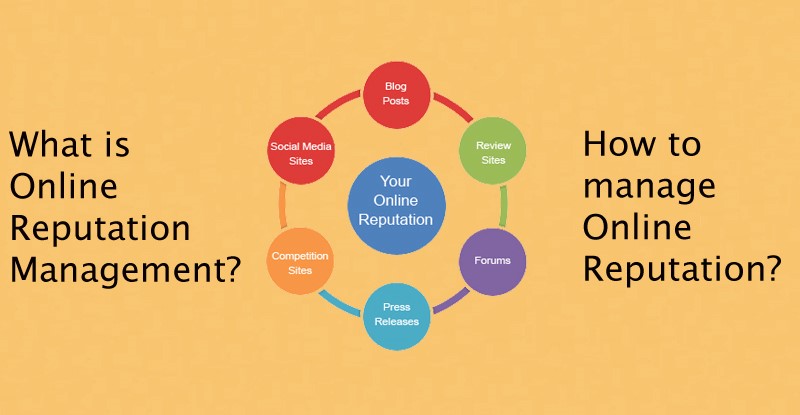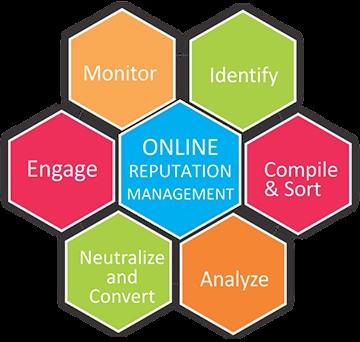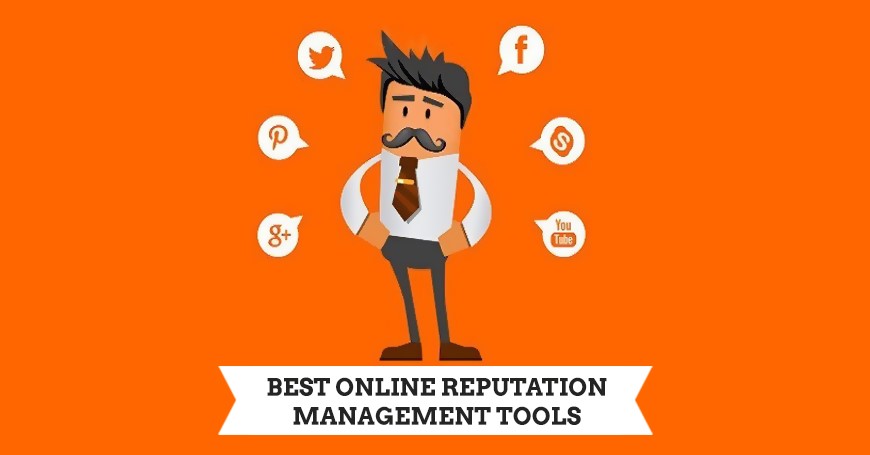What is online reputation management ?
Online reputation management is a business strategy that helps business entities to improve their visibility on the internet. It also helps them to respond to the reviews posted by customers on the regular review sites like Yelp, Google My Business, and so on.
How to do online reputation management ?
We shall have a brief recap on how to do online reputation management. You know the importance of having an excellent online reputation. The best aspect of maintaining an online reputation is that you can do it yourself. It does not take much effort at all. Of course, you have the tools to help you. Nevertheless, you should make the effort on your own as well. These simple steps should help you build up and maintain your online reputation yourself.
- Google Yourself – It is a good idea to search for yourself on the internet. Try out your regular names, nicknames, misspellings of your name, and so on. You can also include keywords like the name of your city, school, college, and so on.
- Improve your security – If you find objectionable material against your name, try to remove these links. Your prospective customer or employer should not have access to them. You can either remove them or make them private. Everyone is conversant with the use of Facebook tools. It is easy to beef up your security on social media websites like Facebook.
- Consider changing your name – A name like John Smith is a common one. You will find millions of John Smiths in the world. Consider adding your middle initial or your birthdate to your name to distinguish from the other similar names.
- Build your brand – Have a responsive website where your customers can interact. Update your content regularly so that the customers get something new to see every time they visit your website.
- Stay vigilant – Prevention is always better than cure. Stay vigilant and prevent the malicious elements from eroding your online reputation. Setting up Google alerts, having separate email address for personal and professional use, and being careful with the use of words can help you build a good online reputation.
We have seen the different aspects of online reputation management and understood how to build up and maintain a good online reputation. We have also looked at some of the online tools that can help us in the bargain. Use these methods to build up a good reputation. Strive hard to maintain the reputation at all costs. In case you see a dip in your online reputation, take corrective measures to rectify the situation.
Why is managing reputation important for your business?
You must have heard these words of wisdom. “If wealth is lost, nothing is lost; if health is lost, something is lost; if the character is lost, everything is lost.” The same logic applies to your online reputation. People do not know you when they visit your website searching for business. Your status is the one thing that counts. If you have a good reputation, customers approach you for deals. On the other hand, a dodgy reputation can become a kind of a roadblock for your business.
Your online reputation counts everywhere. In today’s online world, it is crucial to have an excellent online reputation. It is because a bad reputation spreads much faster than a good reputation does. Let us see the same example of the restaurant. If out of 10 people who visited the restaurant, two felt the food was bad, you can be sure that the restaurant will get two bad reviews. Out of the eight people who loved the food, maybe a couple might post a good review. The point we are trying to make is that people do not miss any chance to post a negative review. They may or may not post a positive one, but a negative one, they will. Therefore, building up and maintaining a good online reputation is not as straightforward as you think. There are a lot of twists and turns on the road.
We shall see how to build an excellent online reputation. However, before that we shall see why managing an online reputation is necessary for your business.
When does your online reputation matter? Your online reputation matters at all times. However, it assumes significance under some of the following circumstances.
- Building up a business – Building a business requires you to attract customers and close out deals. An excellent online reputation helps you do that comfortably. Good positive reviews play a tremendous role in building up your online reputation. It is vital to encourage people to post their reviews. It usually happens that people never forget to post negative reviews, but become reluctant to post positive ones. Building an online reputation is essential in any business.
- Searching for a job – At this age, people apply for jobs online. Recruiters search for your online behavior to understand your online reputation. Everything you do on the social media network becomes essential. Your prospective employers check out and screen candidates online. There have been innumerable instances of dismissing candidates based on their bad online reputation.
- Networking with people – It takes a long time to build a good reputation, but seconds to lose one. Your status makes a significant difference when you network with people. It includes your business partners, employees, the media, and everyone.
1. Where do people search for businesses online?
Naturally, they do on the search engines. Not many people go beyond the first page of a Google search. Customer reviews play a significant role in your website attaining a rank on the first page of Google. One of the primary things every business does is to acquire a Google My Business listing. It allows customers to post reviews. The more positive reviews you get, the higher is your ranking. A higher rank automatically results in a better online reputation.
2. How do good reviews help your online reputation?
Naturally, they do on the search engines. Not many people go beyond the first page of a Google search. Customer reviews play a significant role in your website attaining a rank on the first page of Google. One of the primary things every business does is to acquire a Google My Business listing. It allows customers to post reviews. The more positive reviews you get, the higher is your ranking. A higher rank automatically results in a better online reputation.
3. The role of social media
Social media has a significant part to play in building up an online reputation. It is not new for people to approach friends on social media like Facebook to solicit clients and build up their reputation. You can also leave reviews about businesses and products on social media.
What are the common problems people face while managing a reputation for their business?
One of the most significant problems people face while managing online reputation is that they are not aware whether they have a good or a bad reputation. Here are some key factors that can help you determine the quality of your online reputation.
1. Signs of a good online reputation:
- Accurate Search result – Naturally, you would like the search results to return your name when people want to find you. You have an excellent online reputation when you experience this situation.
- Accurate Information – It is essential for you to provide consistent and reliable Today, prospective employers go through the social media accounts to verify the information you provide to them through the application. If you maintain consistency, your online reputation gets a boost.
- Active participation – If you wish to have an excellent online reputation, you should consistently participate online, either on social media or your blog. This online activity gives a fair idea of your understanding and knowledge, especially in your area of expertise.
- Positive reviews – Receiving positive reviews is a sign of an excellent online reputation.
2. Signs of a bad online reputation:
- Inaccurate Results from searches – Finding nothing or negligible information about your business on searching online is a sign of a bad online reputation. Also, it invites unscrupulous elements to post unfavorable material about you and your company.
- Negative reviews – A single negative review can undo the good work of a hundred positive reviews.
- Sharing controversial opinions or using inappropriate language – The internet is a fantastic tool that helps you connect with the entire world. You use forums like Facebook, Twitter, and LinkedIn, and so on to discuss various matters. Sharing controversial opinions can wreck your online reputation.
- Post Embarrassing photos – Social media is a great place to share pictures and images. However, posting and sharing inappropriate or embarrassing photos can backfire on you as it gives you a bad online reputation.
- Rub with the law – Having a run-in with the law or unsavory credit history can also affect your online reputation. The problem with the internet is that it does not forget anything.
Things most people don’t know about online reputation

Having a clean online reputation is critical. It helps to promote your brand and business. We have already stated that it does not take much time to lose a reputation. People do not know many things about online reputation. Let us discuss some of the issues that people are not aware of.
1. Social media privacy is a myth
Usually, people opine that content on private social media accounts is safe. You can lock your social media profiles so that no third person can have a glimpse. However, it is not so. People having access to your private profile can save photos, take screenshots, copy text messages, and share content easily.
2. Your online reputation can affect your credit score
Everyone acknowledges the role of credit bureaus in influencing the decision of lenders when making lending decisions. However, many lenders are now turning to social media to assess the creditworthiness and financial reputation. There are moves to incorporate the social media activity in the credit scoring procedure
3. It is not so easy to remove negative reviews
It is vital for business enterprises to monitor and respond to negative reviews. You have options like Ripoff Report removal to eliminate the negative reviews, but it is not easy to convince these massive search engines like Google, Yelp, and so on to remove them. You can face a challenging task if some of the top ranking websites incorporate your negative reviews.
4. Fortunately, you have the law on your side
The law can help you contend with negative reviews. You can file defamation suits against people. Google can also help you to a certain extent in removing the sensitive information from search results.
5. Sometimes, you name can be your undoing
It is possible to have a poor online reputation for no fault of yours. A criminal can have the same name as you have. It can cause you a lot of embarrassment when people search for you online, and they come up with a whole lot of negative news about your namesake. It is difficult to control such a situation, but it does affect your online reputation significantly.
20 Tips to increase online reputation
Now, that you know the difference between a good and a bad online reputation, we share with you tips on how to build up your online reputation.
Building an online reputation takes time. You have to be consistent in providing information. Once you build up an online reputation, it is vital to maintaining it. A couple of negative reviews can send your reputation down a slippery slope.
1. The sooner you start, the better it is
As in every other field, a strong foundation is necessary to build up an excellent online reputation. It is better to start early before the negative issues start creeping in. Therefore, do not put off the task of building up an online reputation. The earlier you start, the better it is for you.
2. A professional touch can do wonders
Bring out the professional side of your personality in your online brand. Post a couple of professionally taken photos and images. Use them frequently enough to outrank the inappropriate or embarrassing photos that might come up anytime.
3. Link all your online accounts

It is a good idea to claim online accounts in all the possible social media accounts if you do not have them already. If you have these accounts on sites like Pinterest, Instagram, Tumblr, and so on, take immediate steps to link all of them. It is also essential to apply the necessary privacy settings to protect the content you share through these channels.
4. A Google+ account is beneficial
Google+ is a fantastic social media channel to have an account. You can link your emails, photos, files, and so on in Google+. Leveraging your Google My Business account is also possible through Google+. Google is the most widely used search engine platform in the world. Having a Google+ account is thus beneficial as Google uses various elements from Google My Business like logos, photos, contact information, business hours, customer reviews and so on to populate visible areas of the Google search results.
5. Register your online domain
Register your business domain to facilitate exact searches. It is better not to use any spelling variants because exact searches always rank better on the search engines. If you find the domain name has already been taken by someone else, try to buy it from the owner. Register the domain name for as long as possible to discourage other businesses from buying it when it comes for renewal.
6. Do not let any account become dormant
Having social media accounts is one thing and using it actively is something different. Usually, you find the top social media sites like Facebook, Twitter, LinkedIn, Google+, and YouTube ranking high on the search results. As you have an account in each one of them, it makes sense to use them actively. Letting an account become dormant is not going to help your online reputation at all.
7. Develop and share your content
When you have your website, share everything vital on it. Build up an active portfolio to highlight your accomplishments and strengths. Remember to use your real name to share content. Create a blog and update it regularly. Make it a point to share positive information alone as it can help you build your reputation.
8. Highlight your positive reviews
It is natural for you to get reviews and upvotes for the content you share on your website. You can highlight such reviews with a link. Share it with your social media contacts and encourage engagement. It can help increase your online reputation.
9. Let others benefit from your knowledge
Write guest blogs and posts on your area of expertise. Let people take the benefit of your advice. Use this opportunity to score some positive reviews that could help build your reputation. It is better to post on high quality websites. It offers you a good chance of earning reputation-supporting links in search results.
10. Be active with your conversations online
The internet is the best place to share conversations, especially in the matters that interest you. Discuss and offer your opinions on your hobbies and special interests. Leaving insightful comments can help people engage with you thereby helping you to build up a strong online reputation. It pays to use your real name when you are active with your conversations online.
11. Monitor your reviews regularly
Go through your reviews regularly to check out the good ones and the not-so-good ones. It helps you to take appropriate action on the satisfactory reviews. You get a chance to introspect and improve your functioning. You can end up enhancing your online reputation.
12. Be polite in your reactions
When you see a negative review popping up from nowhere, it might require a rebuttal. Maybe, the person posting the review might not have got the facts right. It is better to educate the person by responding to the review. A polite attitude can help matters a great deal under such circumstances.
13. Take criticism in your stride
Sometimes, you can be wrong. It is always better to be humble and take criticism in your stride. It shows your attitude and helps you to improvise. When you accept criticism sportingly, it enhances the respect you have online thereby paving the way towards developing a strong reputation online.
14. Your Google Page 1 is your business card
Attaining a rank on the first page of the Google search engine is a tremendous achievement. Use your Google Page 1 status as your business card to enhance your online reputation.
15. Learn from your mistakes
Everyone makes mistakes in the world. The persons who realize their mistakes and learn from them are the ones having a good reputation. Learn from your mistakes and ensure that you do not repeat them in the future.
16. Seek help if required
Seeking help from someone better than you should not be an issue at all. Keep aside your ego and wholeheartedly seek advice from people. It can make them feel important and help build your reputation at the same time.
17. Onsite Optimization
Attaining a first-page rank on Google is comparatively easier than maintaining it. You have to update your website regularly with fresh content. Stale content can affect the online reputation. Hence, it is advisable to use onsite optimization techniques like incorporating SEO titles, introducing interesting and appropriate Meta tags, seeking reviews from customers, displaying testimonials, and taking prompt corrective action on the feedback you receive.
18. Offsite Optimization
You should take every measure possible to ensure your website remains on the first page of the search engine. Offsite optimization techniques play an active role in maintaining the status. Seek backlinks from authority websites, share valuable content on social media, contribute to blogs on quality websites, enlist the support of influencers, and so on.
19. Generate positive reviews
The best way to generate positive reviews is to provide customer service of the highest order. Positive reviews encourage people to try out your services and products. It is similar to generating positivity. Just as a positive approach helps you to develop your personality, positive reviews go a long way in improving your online reputation.
20. Learn to use online reputation tools
Take the help of technology, and make use of the online reputation tools available on the market. Let us now go on to discuss some of the most widely used tools in the industry. We shall also discuss some prominent tools for monitoring your online reputation, review management, review generation, and so on.
Best tools for online reputation management

Building up an online reputation is a challenging task. However, you have some terrific tools that can help you along your way. Here are some of them.
1. TribeLocal
TribeLocal is one of the best platforms to manage online reputation for any local business. Tracking reviews, responding to customers, analyzing star rating on all directories and social channels, generating reviews and managing a positive online reputation is very easy with TribeLocal. TribeLocal also provides best customer services online. Try TribeLocal for Free.
2. KnowEm
KnowEm is a username search tool that helps you find more than 500 social networks, domain names, and trademarks. It enables you to find out the domains taken and those available for you to claim. You can also use this tool to find domain names to snap up before someone else does.
3. Google Alerts
Use this tool to get alerts for your name, username, and common variations thereby enabling you to monitor the web for any new content that can pop up from nowhere.
4. HootSuite
The HootSuite tool helps to manage your social media presence as you can schedule posts, get analytics and much more. This tool helps in the professional and convenient handling of your online reputation.
5. Help a Reporter Out
Use this tool to respond to queries. You can help reporters by providing them a chance to interview you. Use this tool to gain a citation as an expert source.
6. UberVU ORM Tool
Easy to set up, this ORM tool helps you to dissect and analyze your brand’s web-based social networking information and indicate insights like patterns, influencers, stories, and so on to use in real time. Note that this tool is a paid tool. However, each account of UberVU can incorporate unlimited clients with free training and support facilities. Clients get a free trial as well.
7. Reputation Defender ORM Tool
Building up a reputation is one aspect. Defending your online reputation is another. The Reputation Defender ORM tool can expel flaws from your online presence. It offers a variety of SEO services to help maintain your business reputation. The Personal marketing machine feature helps you to monitor your reputation and helps you develop your online character and track your reputation.
8. The Ask Tool from ReviewTrackers
Generating reviews from your customers is essential to build up an online reputation. You can take the help of review generation tools like the Ask Tool from ReviewTrackers. You can generate reviews through email campaigns, SMS, on-site kiosks, and customizable landing pages. The normal review sites contain a lot of negative reviews. However, this platform helps you to reach out to your brand promoters thereby enabling you to get more 5-star responses. Asking for a review is always better than an unprompted or unsolicited review. This tool has some fantastic features like the Smart Suggest feature to help you identify the review sites where you can benefit by getting more reviews.
How to tackle negative reviews ?
Every business can expect the odd negative review. No one is perfect in this world. Also, you deal with a variety of people having diverse interests. You cannot satisfy everyone. Hence, getting an odd negative review is a regular occurrence. The most important aspect of maintaining a perfect online reputation is to learn how to deal with such negative reviews.
1. Do not ignore negative reviews
People feel that negative reviews will disappear over a period. No, they do not. They can rear their ugly head any time. Hence, you should not ignore them. Tackle them with a great deal of tact.
2. Rebut the fakes reviews
Not all reviews are genuine. You get fake positive as well as negative reviews. It is better to refute the false reviews and negative reviews immediately. While doing so, ensure that you produce facts to substantiate your reply. People reading these negative reviews develop a prejudiced mind. A quick rebuttal from you side restores sanity as people see the other side of the story as well. It helps them arrive at an informed decision.
3. Legal recourse is available
If you find a review or two affecting your reputation adversely, you have the opportunity to initiate legal proceedings against the person posting such reviews. If they are wrong in the first place, they will refrain from pursuing the matter. Under such circumstances, seek their apology on the same channel. It can help boost your online reputation.
4. Learn to accept mistakes
Occasionally, the negative reviews can be genuine. You should admit your mistake and vow to improve your performance. You can reply to these negative reviews by thanking the person posting them and stating that you value such reviews that help you to improve your services. Yielding a bit of ground here can help you maintain your online reputation.
5. Try TribeLocal for Free
TribeLocal offers a free review generation tool to send review invites to customers/clients asking reviews about and feedback about your business.
Get more reviews on google today.
Signup and get 100 free SMS reviews.
START FREE TRIALNo card required













